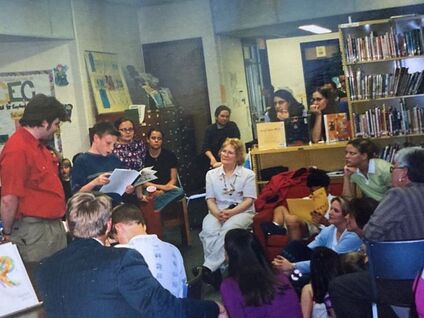|
I saw him from across the busy street—a young boy crying—no adult in sight. I walked over to him and asked what was wrong. “I’m tired of being told I’m stupid.” “Who calls you stupid?” “Everyone. I’m eight-years-old and I can’t read. I’m stupid. “ “Not being able to read doesn’t make you stupid, it means you need special help.” “Lots of people try to teach me but nothin’ works. I’m just stupid.” As we were talking, a woman came up to him. “Teddy, I’ve been looking all over for you. Why did you run away?” He didn’t answer. He moved closer to me. I guessed she was his mother. If she asked who I was, what would I say? A woman who saw her son crying and tried to comfort him?” That was many years ago but I never forgot him. I kept thinking about how his not being able to read at eight made him feel stupid. I had been working with children in other countries teaching English as a foreign language and had used stories in different ways to help children read. Here I was, a professor teaching at a university with a school on campus (The College School) that served children with learning differences. Why couldn’t I devise a program to help children attending this school learn to read?
The University Honors Program had a service-learning component, which meant that students, in addition to class meetings, did some kind of service. I decided helping children to read was a worthy service-learning project. When I contacted the Director of the College School to ask if she was interested in having the children in her school participate in a program to help them read, she said they already had undergraduate tutors teaching reading. I told her my students wouldn’t be tutors, they would form a partnership with the child they would work with and they’d be storypartners. She was interested and asked me to develop a possible program. After talking with her, I devised “The Stories Project,” a service-learning course that consisted of an undergraduate and a child. The relationship was a partnership—each would tell and write stories. There would be ten sessions, each starting with my student telling a world tale to the child. The child would then create an image arising from the story and write a story that the undergraduate would collect. At the end of the ten sessions, my students would write a story for their storypartners, and each child would write a story for an unborn grandchild. My students would collect the images and stories and make them into a book. The books would be given to their storypartners at an authors’ celebration. It took time to arrange—meetings with the director to get her and her staff’s approval, setting up an undergraduate course, putting it in the course catalogue, working up a syllabus, hoping enough children would volunteer, hoping enough undergraduates would sign up for the course, which required, in addition to class time, ten hours of working one on one with a child, plus time to collect images and stories and make them into a book. A lot of pieces had to fall into place. And yet, it happened. Children volunteered. Undergraduates signed up for the course. Each class period my students talked about the troubles and joys of working with the children, each with different learning problems. During one class period one of my students complained that every story her storypartner wrote involved murderous violence. What should she do? He had titled his book, “People Killing Other People,” and the cover was a photograph of him shooting a toy gun. The males in the class poopooed the violence saying it was just “male stuff.” Then a mass shooting occurred, shocking everyone, including the males in my class who began to rethink their positions. I suggested my student approach her storypartner and ask how he felt about what happened and, depending on what he said, ask if he wanted to write a story based on how he felt. I called the Director of the College School, told her what he’d done, and asked for her support in encouraging all the children in the school to reconsider the effects of violence on people. My student returned to class after meeting with her storypartner. “Ben was crying. He felt terrible. He said he wanted to write all new stories and make a new cover. There’s not enough time for us to write ten new stories. What should I do?” “It’s important and encouraging that he wants to change his stories,” I told her. “Perhaps he could revise the stories he’s written and replace gun violence with environmental violence like tornados and earthquakes. If he wants to write new stories, let him tell you them while you tape them so you don’t have to wait for him to actually write each story. I’ll excuse you from class to give you extra time.” In the end, he wrote some new stories and modified those he had written, changing the violence to various kinds of disasters. His story for an Unborn Grandchild read: “It’s all right to be small because there are some advantages like being flexible and not having old bones, plus it’s easy to sneak around and hide.” He told my student, his storypartner, that he’d been bullied a lot because he was small and didn’t want his grandchild to feel bad if he was small. Like the little boy who felt stupid because he couldn’t read, Ben felt bad about himself because he was so much smaller than his classmates. When he told my student about the bullying, she asked the male students in class how she might respond. They gave her a lot of suggestions, which she told him came from “big boys, in college. Knowing that “big boys” cared about him helped Ben feel better about himself. In the ten new stories he wrote there was no gun violence. He titled his new book, “Ben’s Book. The cover image was a white roundish shape on black background. When my student asked him about the cover, Ben responded, “It’s a special kind of egg that hatches good things and people.” My dream of helping children to read ended up being that and much more. By enabling children to tell their stories, not only did their reading and writing improve, they found ways to feel good about themselves. Have you ever had an experience that spurred a dream? If so, what happened?
2 Comments
Marlene Simon
12/8/2022 04:17:48 pm
Wow, were they lucky to have you! Your creativity, your sensitivity, your humanity, your willingness to try new things and your flexibility were so inspiring. It is also true that you had great support for your original ideas. It sounds like a wonder fit for you and the college. Much to be grateful for. I love hearing the unfolding of your process - how you developed programming through personal experiences. You would see a need and want to fill it as creatively and inclusively as possible.
Reply
Leave a Reply. |
Monthly StoriesStories inspired by world tales to challenge and comfort. Archives
July 2024
Categories |
Copyright © Nancy King 2020 | Site Design by Angulo Marketing & Design
|
|
Nancy King is a widely published author and a professor emerita at the University of Delaware, where she has taught theater, drama, playwriting, creative writing, and multidisciplinary studies with an emphasis on world literature. She has published seven previous works of nonfiction and five novels. Her new memoir, Breaking the Silence, explores the power of stories in healing from trauma and abuse. Her career has emphasized the use of her own experience in being silenced to encourage students to find their voices and to express their thoughts, feelings, and experiences with authenticity, as a way to add meaning to their lives.
|


 RSS Feed
RSS Feed